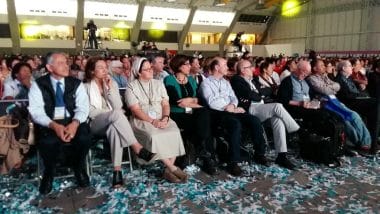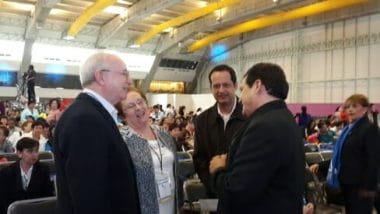 “It’s a historic event”; “There’s no turning back”; “Only through our communion will we solve the problems of Mexico.” These were some of the phrases that were joyfully echoing in the corridors of the Centro Expositor, an avant-garde but functional structure that adds to the already rich architectural patrimony of the city of Puebla. The slogan “Young people, family and life united in the joy of the New Evangelisation” was the backdrop of the three-day conference (October 16-18, 2015). Accompanying the reflections presented at the main assembly, there was also a series of reports and roundtables, with twenty simultaneous focus groups that strengthened awareness in the thousands of participants, of the important social role that comes with being part of a Church movement.
“It’s a historic event”; “There’s no turning back”; “Only through our communion will we solve the problems of Mexico.” These were some of the phrases that were joyfully echoing in the corridors of the Centro Expositor, an avant-garde but functional structure that adds to the already rich architectural patrimony of the city of Puebla. The slogan “Young people, family and life united in the joy of the New Evangelisation” was the backdrop of the three-day conference (October 16-18, 2015). Accompanying the reflections presented at the main assembly, there was also a series of reports and roundtables, with twenty simultaneous focus groups that strengthened awareness in the thousands of participants, of the important social role that comes with being part of a Church movement.  The first report was presented by Anna and Alberto Friso, members of the Pontifical Council for the Family, who examined the challenges to an institution that is more and more under attack due to the influence of individualism , but which remains as a light for society precisely because it is a “little church”. A variety of academics, civil leaders and members of the most prestigious institutions in the country, such as IMDOSOC, Mexicanos Primeros, A favor de lo mejor, México Evalúa and others, offered interesting presentations that helped to understand this North American country from many different angles: politics, mass media, education and social action. Among the testimonies there were also three aritsts of international fame: Liana Rebolledo, Eduardo Verástegui and Emmanuel. A very touching testimony was given by Margaret Karran, an Arab Christian focolarina from Haifa who up to a short time before had lived in the Holy Land in direct contact with the diverse religious expressions that are found there.
The first report was presented by Anna and Alberto Friso, members of the Pontifical Council for the Family, who examined the challenges to an institution that is more and more under attack due to the influence of individualism , but which remains as a light for society precisely because it is a “little church”. A variety of academics, civil leaders and members of the most prestigious institutions in the country, such as IMDOSOC, Mexicanos Primeros, A favor de lo mejor, México Evalúa and others, offered interesting presentations that helped to understand this North American country from many different angles: politics, mass media, education and social action. Among the testimonies there were also three aritsts of international fame: Liana Rebolledo, Eduardo Verástegui and Emmanuel. A very touching testimony was given by Margaret Karran, an Arab Christian focolarina from Haifa who up to a short time before had lived in the Holy Land in direct contact with the diverse religious expressions that are found there.
Put love into practice
Put love into practice





0 Comments